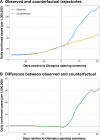Effect of the Tokyo 2020 Summer Olympic Games on COVID-19 incidence in Japan: a synthetic control approach
- PMID: 36127076
- PMCID: PMC9490294
- DOI: 10.1136/bmjopen-2022-061444
Effect of the Tokyo 2020 Summer Olympic Games on COVID-19 incidence in Japan: a synthetic control approach
Abstract
Background: The Tokyo 2020 Summer Olympic Games (23 July-8 August 2021) were held in the middle of Japan's fifth wave of COVID-19, when the number of cases was on the rise, and coincided with the fourth state of emergency implemented by the host city, Tokyo.
Aim: This study aimed to assess whether the hosting of the Games was associated with a change in the number of COVID-19 cases in Japan using a synthetic control method.
Methods: A weighted average of control countries with a variety of predictors was used to estimate the counterfactual trajectory of daily COVID-19 cases per 1 000 000 population in the absence of the Games in Japan. Outcome and predictor data were extracted using official and open sources spanning several countries. The predictors comprise the most recent country-level annual or daily data accessible during the Games, including the stringency of the government's COVID-19 response, testing capacity and vaccination capacity; human mobility index; electoral democracy index and demographic, socioeconomic, health and weather information. After excluding countries with missing data, 42 countries were ultimately used as control countries.
Results: The number of observed cases per 1 000 000 population on the last day of the Games was 109.2 (7-day average), which was 115.7% higher than the counterfactual trajectory comprising 51.0 confirmed cases per 1 000 000 population. During the Olympic period (since 23 July), the observed cumulative number of cases was 61.0% higher than the counterfactual trajectory, comprising 143 072 and 89 210 confirmed cases (p=0.023), respectively. The counterfactual trajectory lagged 10 days behind the observed trends.
Conclusions: Given the increasing likelihood that new emerging infectious diseases will be reported in the future, we believe that the results of this study should serve as a sentinel warning for upcoming mega-events during COVID-19 and future pandemics.
Keywords: COVID-19; Health policy; Public health.
© Author(s) (or their employer(s)) 2022. Re-use permitted under CC BY-NC. No commercial re-use. See rights and permissions. Published by BMJ.
Conflict of interest statement
Competing interests: None declared.
Figures
References
-
- The Asahi Shimbun . Survey: 68% doubt Tokyo Olympics can be held safely. Tokyo: The Asahi Shimbun, 2021. https://www.asahi.com/ajw/articles/14398398
-
- Kyodo News . Tokyo Olympics not perfect but end without major incident: organizers. Tokyo: Kyodo News, 2021. https://english.kyodonews.net/tokyo/news/2021/08/b9926e3575de-update1-to...
-
- Dergaa I, Abdelrahman H, Varma A, et al. COVID-19 vaccination, herd immunity and the transition toward normalcy: challenges with the upcoming sports events. Ann Appl Sport Sci 2021;9. 10.52547/aassjournal.1032 - DOI
MeSH terms
LinkOut - more resources
Full Text Sources
Medical

